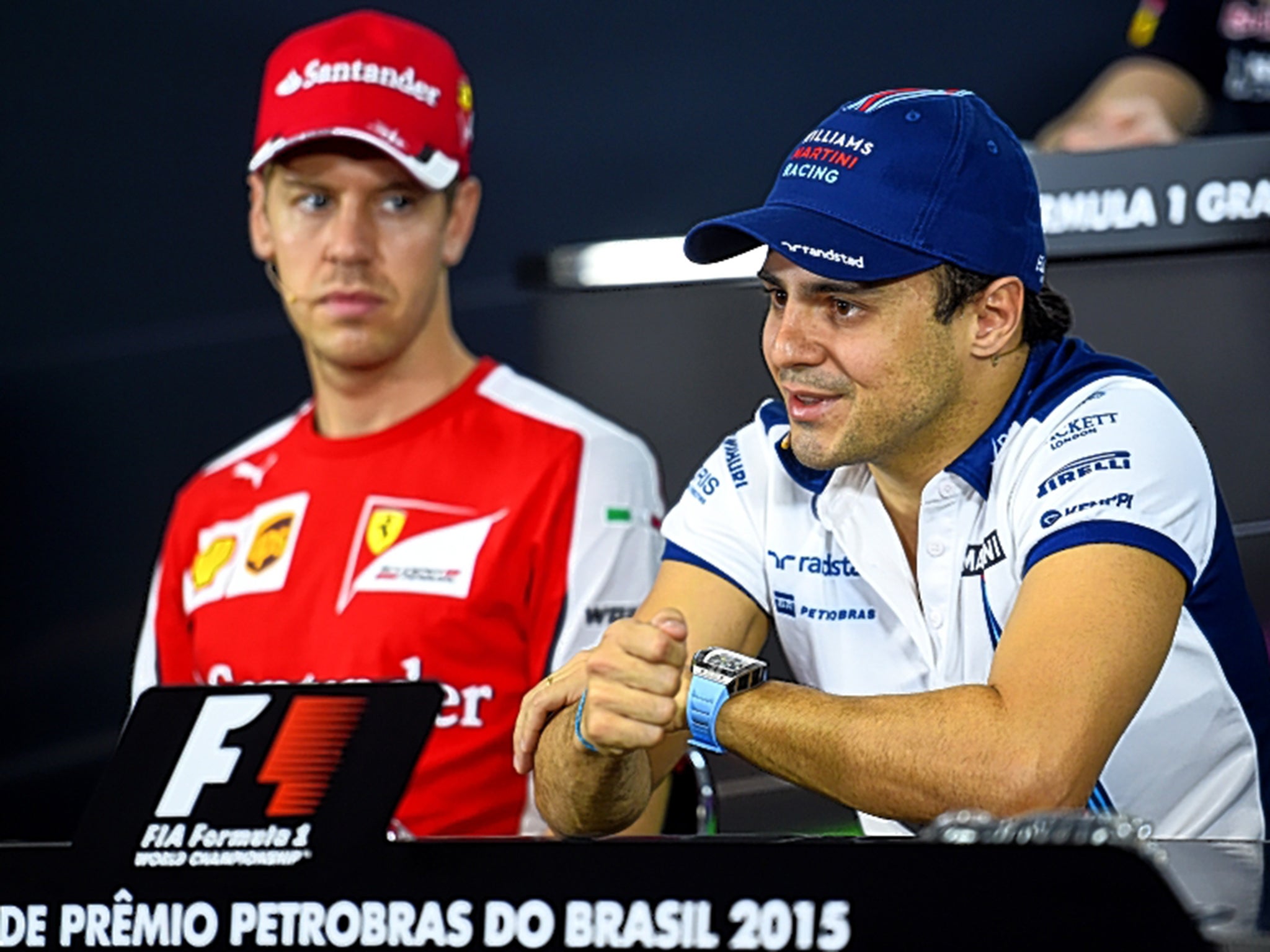Brazilian Grand Prix 2015: No star drivers and no money – Brazil is falling out of love with F1
Brazil’s best active driver Felipe Massa has not won a Formula One race for seven years

Your support helps us to tell the story
From reproductive rights to climate change to Big Tech, The Independent is on the ground when the story is developing. Whether it's investigating the financials of Elon Musk's pro-Trump PAC or producing our latest documentary, 'The A Word', which shines a light on the American women fighting for reproductive rights, we know how important it is to parse out the facts from the messaging.
At such a critical moment in US history, we need reporters on the ground. Your donation allows us to keep sending journalists to speak to both sides of the story.
The Independent is trusted by Americans across the entire political spectrum. And unlike many other quality news outlets, we choose not to lock Americans out of our reporting and analysis with paywalls. We believe quality journalism should be available to everyone, paid for by those who can afford it.
Your support makes all the difference.When Lewis Hamilton won the United States Grand Prix last month to secure his third Formula One title, most Brazilians heard about it for only 15 seconds during a football match on Brazil’s leading broadcaster.
Globo shunned the race on its cable channel, reflecting F1’s sinking popularity in a country that was once a Formula one hotbed
This weekend’s Brazilian Grand Prix puts the decline into focus. Brazil no longer has an F1 star to match the likes of three-time champions Nelson Piquet or Ayrton Senna, who was Brazil’s last world champion, 24 years ago.
The country’s best active driver is Felipe Massa, who has not won a race in seven years. And no potential champions appear to be in the pipeline.
The F1 commercial director, Bernie Ecclestone, recognises the problem. He has pressed Globo to step up its coverage. Globo were close to quitting F1 last year, and at the last minute renewed their contract to cover F1 in Brazil until 2020. However, due to the drastic fall in Brazilian TV viewers, they have reduced their live broadcasts to covering qualifying and the race only.
There was also a threat that the promoters of the Brazilian GP could lose the Sao Paulo race before last year agreeing to implement an $80m (£52.5m) upgrade to the circuit. As a result, the Brazilian GP will remain in Sao Paulo until 2020.
Massa has tried to talk up the level of enthusiasm there will be for tomorrow’s race in Brazil, but also referenced the recent rise of the Mexican GP. “Definitely, it was nice to see what happened in Mexico, and that’s what Formula One needs,” Massa said this week. “Everybody was really happy... to race in that atmosphere. That’s what we need. I’m sure we will see a lot of support here in Brazil, in our way.”
Yet only diehard fans are expected at Interlagos tomorrow, after the championship was settled two races ago. “The title race is decided, Brazil’s economy is in crisis, Brazilian drivers don’t stand a chance of winning – and Formula One is less and less on TV,” Erich Beting, owner of sports marketing firm Maquina do Esporte, said.
Another measure of Brazil’s falling interest, and a key one for sponsors, comes from private ratings company Ibope, which is used by local TV networks.
In 2008, when Hamilton and Massa were fighting for the title in the final race of the season, Globo scored 33 points on Ibope’s scale for the Brazilian Grand Prix. This year’s race is expected to be half that – or less.
Most local football matches draw higher ratings, and a game between big teams like Rio de Janeiro’s Flamengo and Sao Paulo’s Corinthians rarely drops below 20.
Globo’s best F1 score this season was 10.2 on Ibope’s scale for the Canadian GP in June. Ratings for the Malaysian race in March, hours before dawn in Brazil, were among the worst for a Globo F1 broadcast: three points as counted by Ibope.
Beting, a sports marketing expert, also noted that the Williams team’s sponsorship deal with Brazilian state-run oil company Petrobras may not sit well with many locals.
Petrobras is embroiled in a multi-billion-dollar bribery scandal that has prompted calls for the impeachment of the Brazil President Dilma Rousseff. With Brazil’s economy in recession and the value of the local currency plummeting in relation to the US dollar, Beting noted of Petrobras: “This is a company involved in a big corruption scandal. Brazilians might start asking why they are spending with a racing team.”
Join our commenting forum
Join thought-provoking conversations, follow other Independent readers and see their replies
Comments